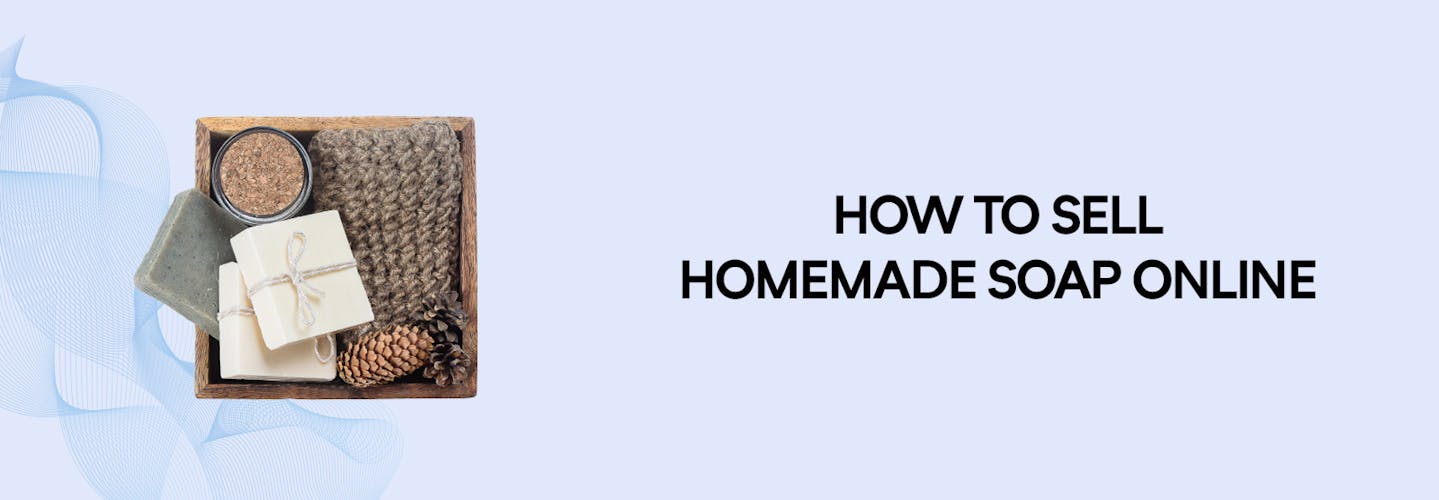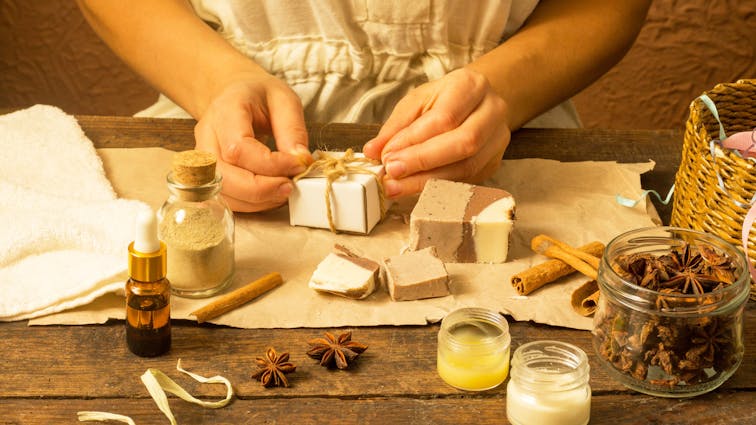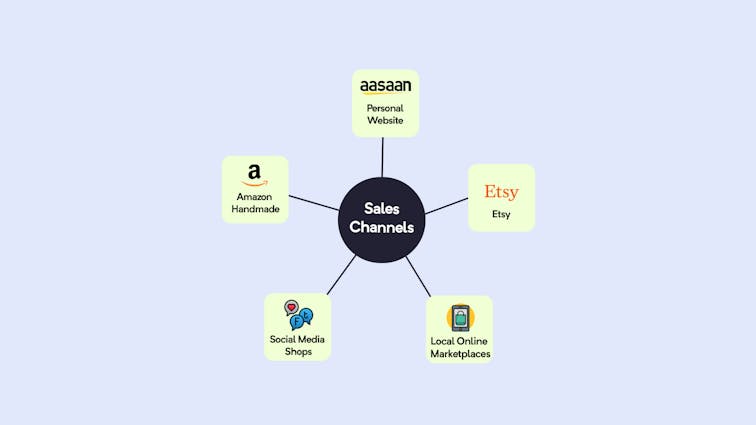
How to Sell Homemade Soap Online: A Comprehensive Guide
In a world where authenticity and natural ingredients are highly prized, the homemade soap industry has seen a remarkable resurgence.
From humble kitchen concoctions to artisanal masterpieces, homemade soap has transformed from a niche hobby into a thriving industry.
According to Statista, The global revenue in the home & laundry care market was forecast to continuously increase between 2023 and 2028 by 44.7 billion U.S. dollars (+22.9 percent). The revenue is estimated to amount to 239.81 billion U.S. dollars in 2028.
The allure of homemade soap lies in its uniqueness and quality. Unlike mass-produced alternatives, homemade soap often contains natural ingredients, crafted with love and creativity.
It’s not just a cleansing product; it’s a statement, a piece of art, a connection to nature.
The Potential of Selling Homemade Soap Online
Imagine turning your passion for soap-making into a profitable online business. The digital age has opened doors for artisans like never before.
With the rise of e-commerce platforms and social media marketing, selling homemade soap online is not just a possibility; it’s a promising pathway to success.
People are increasingly seeking unique, high-quality products that resonate with their values and aesthetics.
Selling homemade soap online taps into this demand, offering a world of opportunities for creative entrepreneurs.
Understanding the Basics of Soap Making

Before diving into the world of online sales, one must master the art and science of soap making.
It’s a craft that combines creativity with chemistry, where oils, lye, and fragrances meld into something extraordinary.
There are various methods of soap making, such as the cold process, hot process, and melt-and-pour.
Each has its own charm and complexity. For beginners, online tutorials and local workshops can provide valuable insights and hands-on experience.
Remember, practice makes perfect, and understanding the nuances of soap making is the foundation of a successful online business.
Legal Considerations and Regulations for Selling Homemade Soap
Selling homemade soap online is not just about creativity; it’s about compliance too. Different countries and states have specific regulations concerning the production and sale of homemade cosmetics.
In the U.S., for example, the Food and Drug Administration (FDA) oversees the labeling and safety of cosmetic products, including soap.
It’s essential to research and understand the legal requirements in your jurisdiction. This may include obtaining necessary permits, following labeling guidelines, and ensuring product safety.
Ignorance is not bliss in this context; it can lead to legal troubles and damage to your brand’s reputation.
The journey of selling homemade soap online is an exciting one, filled with opportunities and challenges.
It’s a path that requires passion, skill, diligence, and an understanding of both the art of soap making and the legal landscape.
Importance of Branding in the Homemade Soap Business
In the bustling marketplace of homemade soap, branding isn’t just a buzzword; it’s the heartbeat of your business.
A strong brand distinguishes you from the crowd, tells your story, and connects with your audience on an emotional level.
According to Forbes, consistent branding across all channels can increase revenue by up to 23%. In the homemade soap business, where individuality and authenticity reign supreme, branding becomes even more crucial.
Think of your brand as the personality of your soap. It’s what makes your products uniquely yours.
It’s the promise you make to your customers, the values you stand for, and the experience you offer.
A well-crafted brand doesn’t just sell soap; it builds loyalty and turns customers into advocates.
Tips for Creating a Unique and Appealing Brand
- Know Your Audience: Understanding who you’re selling to is the first step in creating a brand that resonates. Are your customers eco-conscious millennials? Luxury seekers? Health enthusiasts? Tailor your brand to speak their language.
- Tell Your Story: Why did you start making soap? What’s your philosophy? Your story is a powerful tool that can create a deep connection with your customers.
- Design Matters: From logo to packaging, design is a visual representation of your brand. Invest in professional design that reflects the quality and uniqueness of your soap.
- Consistency is Key: Your brand should be consistent across all platforms, from your website to social media to packaging. Consistency builds trust and recognition.
- Engage and Evolve: A brand is not a static entity. Engage with your customers, listen to their feedback, and be willing to evolve. Your brand should be a living, breathing part of your business.
Soap Making Process: Detailed Guide on How to Make Homemade Soap
Making homemade soap is a delightful blend of art and science. Here’s a step-by step guide to the cold process method, one of the most popular ways to make soap:
- Choose Your Recipe: Decide on the oils, butters, and additives. Each ingredient affects the soap’s hardness, lathering, and moisturizing properties.
- Prepare the Lye Solution: Carefully mix lye with water. Always add lye to water, not the other way around, to prevent a dangerous reaction.
- Melt the Oils: Heat the oils and butters until melted and combined.
- Mix Lye Solution with Oils: Slowly add the lye solution to the oils, stirring until trace (a pudding-like consistency).
- Add Fragrance and Color: Customize your soap with essential oils, fragrances, and natural colorants.
- Pour into Molds: Pour the soap mixture into molds and cover to keep warm.
- Cure: Allow the soap to cure for 4-6 weeks. This allows the water to evaporate, resulting in a harder, longer-lasting bar.
Safety Precautions During the Soap Making Process
Lye is a caustic substance, and safety must be a priority. Always wear protective goggles, gloves, and long sleeves.
Work in a well-ventilated area and keep vinegar handy to neutralize any spills. Follow all safety guidelines and never leave lye unattended, especially around children and pets.
Creating a successful homemade soap business online is a journey filled with creativity, passion, and diligence.
From branding to soap making, each step is a blend of art, science, and business acumen. With the right approach, your soap can be more than a cleansing product; it can be a symbol of quality, individuality, and a connection to something pure and authentic.
Factors to Consider When Pricing Your Soap
Pricing is a critical aspect of your homemade soap business. It’s a delicate balance that requires careful consideration of various factors:
- Cost of Materials: Include the cost of oils, butters, fragrances, colorants, and packaging. Don’t forget to account for shipping and handling if you purchase materials online.
- Labor: How much time do you spend making each batch of soap? Consider a fair hourly wage for your labor.
- Overhead: Include costs like rent, utilities, insurance, and any other recurring expenses related to your soap-making space.
- Profit Margin: Decide on a profit margin that reflects the value of your soap and allows your business to grow.
- Market Research: What are other similar products priced at? Understanding your competition can help you position your soap in the market.
- Perceived Value: Your branding, packaging, and unique selling proposition can add value to your soap, allowing you to price it higher.
Balancing Cost and Value for Your Customers
Finding the sweet spot between cost and value is a dance every entrepreneur must master.
Price too high, and you risk alienating customers; price too low, and you undermine the value and sustainability of your business.
Consider offering different price points for various products, such as luxury lines or budget-friendly options.
Bundling products or offering subscription services can also create value for your customers without compromising profitability.
Importance of Marketing in Selling Homemade Soap Online
You’ve crafted the perfect soap, but how do you get it into the hands of customers?
That’s where marketing comes in. In the crowded online marketplace, marketing is not just an option; it’s a necessity.
According to HubSpot, 61% of marketers say improving SEO and growing their organic presence is their top inbound marketing priority.
In the homemade soap business, marketing is the bridge that connects your soap to the world.
Different Marketing Strategies: Social Media, Content Marketing, SEO, etc.
- Social Media: Platforms like Instagram and Facebook are perfect for showcasing your soap. Engage with your audience, share behind-the-scenes glimpses, and collaborate with influencers.
- Content Marketing: Start a blog, create how-to videos, or write an e-book. Content marketing establishes your authority, educates your customers, and improves SEO.
- SEO: Optimize your website for how to sell homemade soap online and related keywords. SEO drives organic traffic and helps customers find you when they search for homemade soap.
- Email Marketing: Build a mailing list and keep your customers informed about new products, sales, and events.
- Partnerships and Collaborations: Collaborate with other artisans or local businesses. Cross-promotion can expand your reach and introduce your soap to new audiences.
- Paid Advertising: Consider investing in paid advertising on platforms like Google Ads or Facebook Ads to target specific demographics or interests.
Selling homemade soap online is a multifaceted endeavor that requires creativity, business savvy, and a touch of alchemy.
From pricing to marketing, each decision shapes your brand, your relationship with your customers, and your bottom line.
With passion, persistence, and a sprinkle of innovation, your homemade soap can cleanse, nourish, and inspire, one bar at a time.
Choosing the Right Online Sales Channels

Overview of Different Online Sales Channels: Personal Website, Etsy, Amazon Handmade, etc.
In the digital age, selling homemade soap online offers a plethora of platforms and opportunities. Here’s an overview of some popular online sales channels:
- Personal Website: A personal website gives you complete control over your brand, design, and customer experience.
- Etsy: A marketplace tailored for handmade and vintage items, Etsy provides a ready-made audience interested in artisan products.
- Amazon Handmade: A subsection of Amazon dedicated to handcrafted products, Amazon Handmade offers exposure to a vast customer base.
- Social Media Shops: Platforms like Facebook and Instagram now allow you to sell directly through your social media profiles.
- Local Online Marketplaces: Consider exploring local online marketplaces that cater to your community or region.
Pros and Cons of Each Sales Channel
Personal Website:
- Pros: Full control, customization, direct customer relationship.
- Cons: Requires more effort in marketing, SEO, and maintenance.
Etsy:
- Pros: Easy to set up, built-in audience, community support.
- Cons: Competition, fees, less control over branding.
Amazon Handmade:
- Pros: Massive exposure, Prime shipping options, trust of Amazon’s brand.
- Cons: Fees, competition, stringent requirements.
Social Media Shops:
- Pros: Integration with social media marketing, accessibility.
- Cons: Limited customization, dependency on platform algorithms.
How to Set Up and Manage Your Online Store with aasaan
Setting up and managing an online store is a journey that requires attention to detail, technological know-how, and a customer-centric approach. Here’s a step-by-step guide:
- Choose a Platform: Select a platform that aligns with your needs, budget, and technical skills like aasaan.
- Design Your Store: Customize the design to reflect your brand.
- Add Products: Include high-quality images, detailed descriptions, and pricing for each soap product.
- Implement Payment Gateways: Choose secure and user-friendly payment options.
- Optimize for SEO: Use keywords like how to sell homemade soap online to improve search engine visibility.
- Monitor and Analyze: Use tools like Google Analytics to track performance and make data-driven decisions.
Importance of Customer Service in Online Sales
In the virtual world of online sales, customer service is the human touch that builds trust and loyalty.
Responding promptly to inquiries, handling issues with empathy, and going the extra mile can turn a one-time buyer into a lifelong customer.
Consider implementing live chat support, creating detailed FAQs, and offering easy return policies.
Remember, a happy customer is not just a sale; it’s a brand ambassador who spreads the word about your wonderful homemade soap.
The path to selling homemade soap online is paved with creativity, strategy, and a sprinkle of digital magic.
By choosing the right sales channels, managing your online store with finesse, and nurturing customer relationships, you can turn your soap-making passion into a thriving online business.
Shipping and Delivery
Shipping is the bridge that connects your homemade soap to customers near and far. Here’s an overview of various shipping options:
- Standard Shipping: Cost-effective and suitable for non-urgent orders.
- Expedited Shipping: Faster delivery for customers willing to pay a premium.
- Free Shipping: Often used as a promotional tool or included in orders over a certain amount.
- Local Delivery: Consider offering local delivery for customers in your vicinity.
- International Shipping: Expand your reach by shipping internationally, keeping in mind customs regulations and additional costs.
Packaging Tips for Homemade Soap
Packaging is more than protection; it’s an extension of your brand. Here are some tips for packaging homemade soap:
- Use Eco-Friendly Materials: Align with the natural ethos of homemade soap by using recyclable or biodegradable packaging.
- Add a Personal Touch: Consider including a handwritten note or a small free sample.
- Ensure Safety: Use bubble wrap or other protective materials to prevent damage during transit.
- Reflect Your Brand: Your packaging should resonate with your brand’s aesthetics and values.
Growing Your Soap Business
1. Strategies for Scaling Your Homemade Soap Business
Turning a hobby into a thriving business requires strategic scaling. Here are some strategies:
- Expand Your Product Line: Introduce new scents, shapes, or themed collections.
- Invest in Marketing: Increase your marketing budget to reach a broader audience.
- Participate in Events: Join craft fairs, farmers’ markets, or pop-up shops.
- Hire Help: As your business grows, consider hiring help for production, marketing, or customer service.
2. Leveraging Partnerships and Collaborations
Collaborations can be a win-win for growth. Consider partnering with local businesses, influencers, or other artisans.
Co-create products, cross-promote, or offer exclusive collaborations. Partnerships can expand your reach, enhance your brand, and create exciting opportunities for growth.
Start Your E-commerce Business with Aasaan

Are you ready to turn your soap-making passion into a thriving online business? Look no further than Aasaan, the zero-code AI headless commerce platform designed to empower SMEs like you.
About Aasaan: Aasaan is not just a platform; it’s your partner in success. With its visually intuitive headless storefront builder and API-driven commerce platform, Aasaan makes building modern, lightning-fast shopping experiences quick and easy. Forget about the technical hassles and dev time; Aasaan provides an end-to-end infrastructure that de-risks the shopping experience for merchants.
Whether you’re just starting or looking to scale your homemade soap business, Aasaan’s best-in-class technology is tailored to meet your needs. It’s more than a platform; it’s a mission to enable SMEs to create exceptional shopping experiences, fast and easy.
Join the Aasaan community today and embark on a journey towards success, creativity, and innovation. Click here to explore Aasaan and start building your online store now.
FAQ’s:
1. Can I sell homemade soap from home?
Yes, you can sell homemade soap from home. However, it’s essential to comply with local regulations, obtain necessary permits, and follow safety guidelines. Selling online through platforms like Aasaan can make the process even more accessible.
2. Can I make soap and sell it online?
Absolutely! Making soap and selling it online is a popular business model. Platforms like Aasaan provide the tools and support needed to create an online store, manage sales, and connect with customers.
3. Is selling homemade soap profitable?
Selling homemade soap can be profitable, depending on factors like production costs, pricing strategy, marketing efforts, and sales channels. Many entrepreneurs find success by offering unique products and leveraging online platforms to reach a broader audience.
4. How can I sell my homemade soap in India?
Selling homemade soap in India involves understanding local regulations, obtaining necessary licenses, and choosing the right sales channels. Online platforms, local craft fairs, and retail partnerships are popular ways to sell homemade soap in India.
5. How do you package homemade soap?
Packaging homemade soap involves selecting materials that protect the product and reflect your brand. Consider using eco-friendly packaging, adding personalized touches, and ensuring that the packaging aligns with your branding. Proper packaging not only enhances the product’s appeal but also ensures it reaches the customer in perfect condition.








